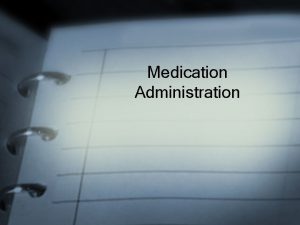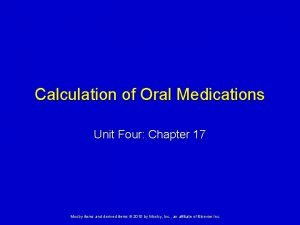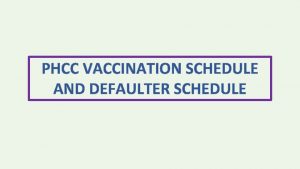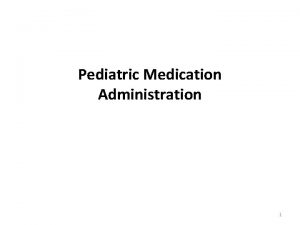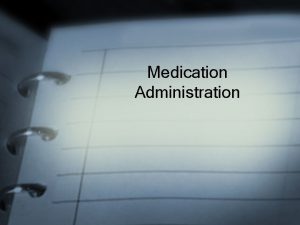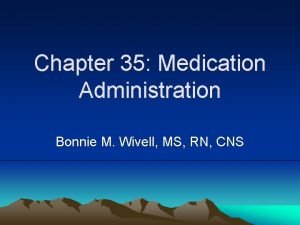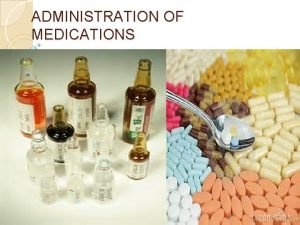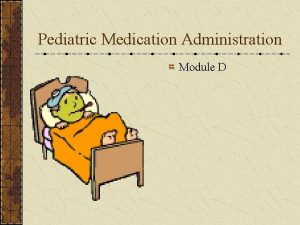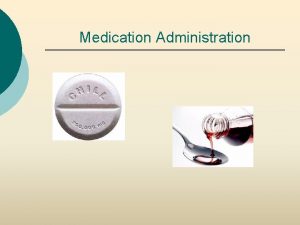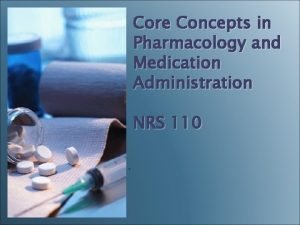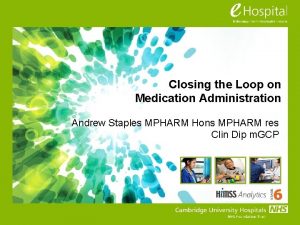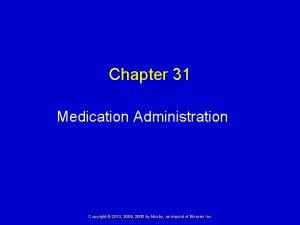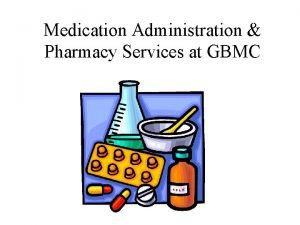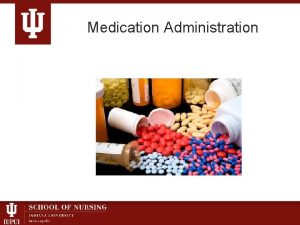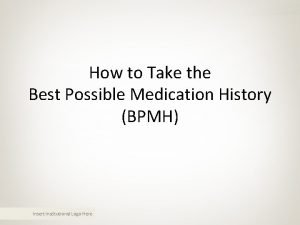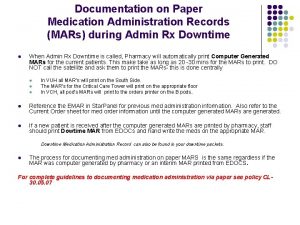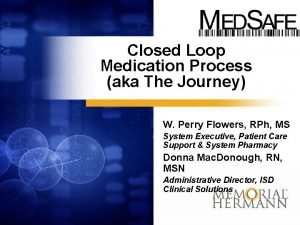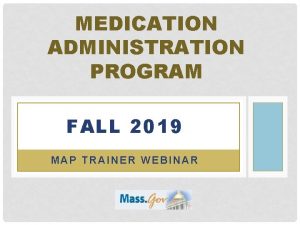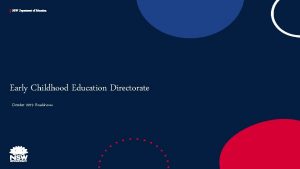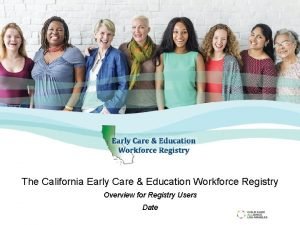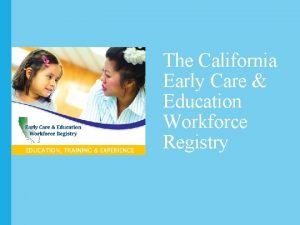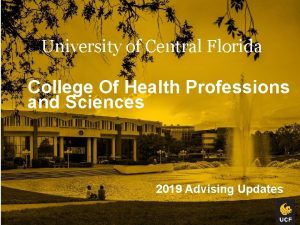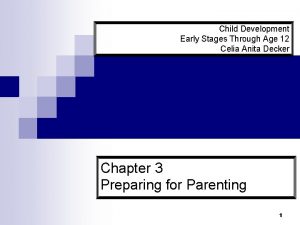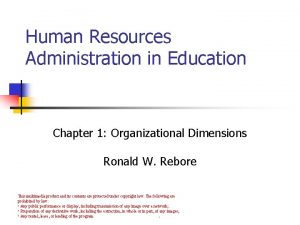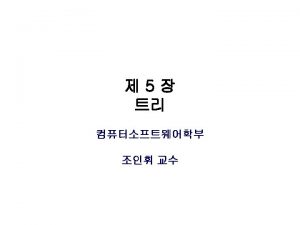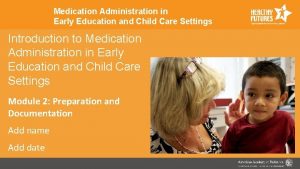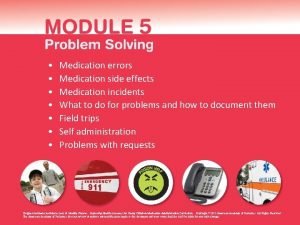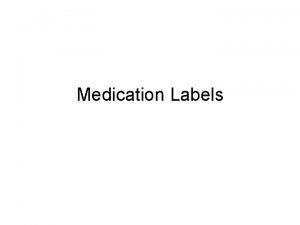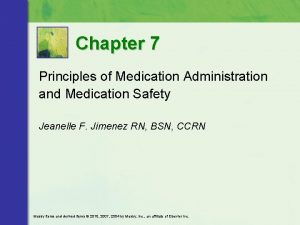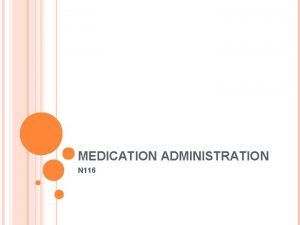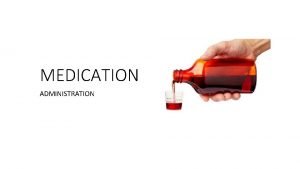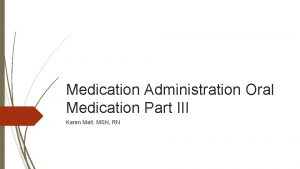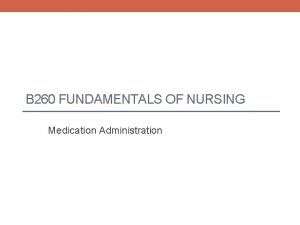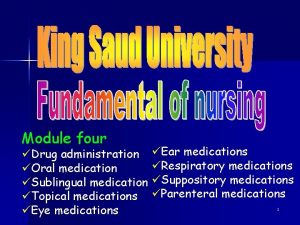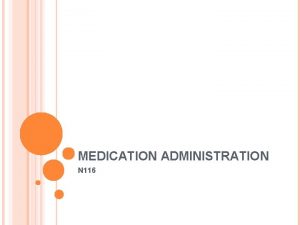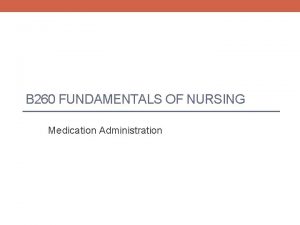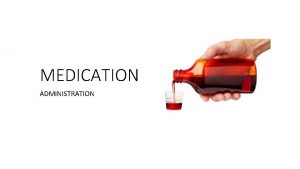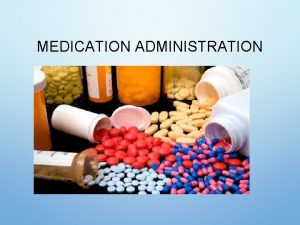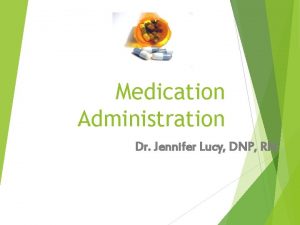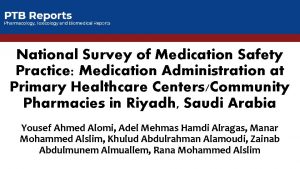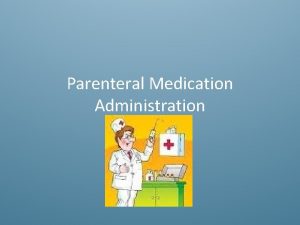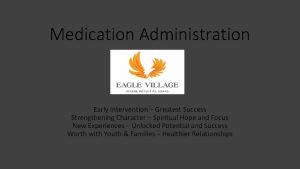Medication Administration in Early Education and Child Care


































- Slides: 34

Medication Administration in Early Education and Child Care Settings Introduction to Medication Administration in Early Education and Child Care Settings Module 4: Problem Solving Add name Add date

Medication Administration in Early Education and Child Care Settings Objectives • Medication errors • Medication side effects • Medication incidents • What to do for problems and how to document them • Field trips • Self administration • Problems with requests

Medication Administration in Early Education and Child Care Settings Communication and Care Preventing errors begins with good communication on drop-off and pick-up

Medication Administration in Early Education and Child Care Settings Responsibility Triangle Parent/Guardian Child Care Provider Health Care Professional

Medication Administration in Early Education and Child Care Settings What is Medication Error? • Giving medication to the wrong child • Giving the wrong medication • Giving the wrong dose • Giving medication at the wrong time • Giving medication by the wrong route

Medication Administration in Early Education and Child Care Settings Preventing Medication Errors • Look at the pattern of errors • Make changes based on the patterns you see to prevent further errors.

Medication Administration in Early Education and Child Care Settings Side Effects of Medication Common side effects include: • Upset stomach • Diarrhea or loose stools • Dry mouth • Drowsiness • Change in activity or mood • Dizziness • Flushing, sweating • Rashes • Rapid heartbeat • Nausea

Medication Administration in Early Education and Child Care Settings Side Effects of Medication, continued • Effects of medication can vary from child to child • Side effects that could be normal for 1 medication might be abnormal for another

Medication Administration in Early Education and Child Care Settings Sources of Information about Medication Side Effects • • • Package inserts or labels Information from pharmacy Prescribing health care professional Health assessment or care plan Reliable reference materials Poison Control Center

Medication Administration in Early Education and Child Care Settings Adverse Effects or Allergic Reactions to Medication Adverse Effects • Undesirable experiences associated with the use of a medication Allergic Reactions • May involve many different types of symptoms • Are difficult to predict • Skin disturbances are the most common • May be mild (redness of skin, itching) • May be severe (life threatening)

Medication Administration in Early Education and Child Care Settings Observation Young children can’t always verbalize side effects, adverse effects, or allergic reactions, so careful observation is essential.

Medication Administration in Early Education and Child Care Settings Medication Incidents (that aren’t errors. . . ) • • Child refusal Spit out doses Vomited doses Spilled medication

Medication Administration in Early Education and Child Care Settings What To Do for Medication Errors, Adverse Effects, or Allergic Reaction • If the child is in distress, call 911 • Notify the center director • Notify parent or guardian • Fill out a Medication Incident Report

Medication Administration in Early Education and Child Care Settings What To Do for Medication Incidents? Always: • Notify the center director • Notify parent/guardian • Fill out Medication Incident Report • Develop and document a follow-up plan Many times: • Contact the health care professional • Child Care Health Consultant Never: • Repeat a dose without specific instructions from a health care professional

Medication Administration in Early Education and Child Care Settings When Should You Call 911? • • • Signs of distress Loss of (or change in) consciousness Blue color or difficulty breathing Swelling of lips, tongue, or face, or drooling Difficulty swallowing Seizure activity Rapidly spreading rash or hives Impaired speech or mobility Getting worse quickly When in doubt

Medication Administration in Early Education and Child Care Settings When Should You Call Poison Control? 800 -222 -1222 www. aappc. org • • • Wrong child Wrong medication Wrong dose Wrong route Wrong time The AAP no longer recommends that syrup of ipecac be used

Medication Administration in Early Education and Child Care Settings If You Call Poison Control Have this information ready: • The medication container • Child’s Medication Administration Packet • Child’s Emergency Contact Form • Child’s current weight

Medication Administration in Early Education and Child Care Settings Medication Incident Report To be completed by the person who administered the medication or his or her supervisor

Medication Administration in Early Education and Child Care Settings Documentation of an Error or Incident • Make notation on the Medication Log for that dose • Complete Medication Incident Report • Follow up according to child care facility policy

Medication Administration in Early Education and Child Care Settings Scenario: Amalia You gave Amalia her dose of amoxicillin at noon and recorded it. At 12: 30, you note that Amalia is scratching her arms and she is developing a rash on her arms. She is happy and playful and is not having any breathing difficulties. You notify her parent who calls her health care professional. Amalia’s picked up at 1: 00 and is brought to the health care professional’s office where she receives antihistamine. Her amoxicillin is discontinued and she is given a new antibiotic.

Medication Administration in Early Education and Child Care Settings Scenario with Amalia, continued

Medication Administration in Early Education and Child Care Settings Transportation Provided by Child Care Facility & Field Trips • A staff person authorized to administer medication • Secured and labeled medication • The proper temperature and conditions • Copies of emergency contact information • Child’s medical forms • Medication log • Side effects, noted • Hand hygiene • Emergency communications

Medication Administration in Early Education and Child Care Settings Child Care Program Refusal There may be an occasion when you must refuse to give medication. Having a well-planned and written medication administration policy is important.

Medication Administration in Early Education and Child Care Settings Inappropriate Requests • Non-essential medication • Medication not authorized by a health care professional • Off-label use • Cough and cold medications for young children

Medication Administration in Early Education and Child Care Settings What to do when refusing to administer a medication? • Have your medication administration policy available • Problem-solve • Child-centered approach • Alternative plans • Look at timing • Consider training

Medication Administration in Early Education and Child Care Settings Responding to Parents/Guardians “I do understand, but for the safety of your child and the other children in our setting…” “I am sorry, but according to our policy…”

Medication Administration in Early Education and Child Care Settings Resources • State Specific Policy Information at https: //childcareta. acf. hhs. gov/licensing • Caring for Our Children at http: //nrckids. org/CFOC • Managing Infectious Diseases in Child Care and Schools, 4 th Ed: A Quick Reference Guide Edited by Susan S. Aronson, MD, FAAP and Timothy R. Shope, MD, MPH, FAAP.

Medication Administration in Early Education and Child Care Settings Pedia. Link: Medication Administration in Early Care and Education Settings For more information, an online course is available through Pedia. Link. To sign up please visit: https: //shop. aap. org/medication-administration-inearly-care-and-education-settings/

Medication Administration in Early Education and Child Care Settings Summary & Questions

Medication Administration in Early Education and Child Care Settings Disclaimer • Curriculum provides education for personnel in the child care setting who give medication to children but are not licensed health care professionals • Curriculum is not a substitute for written policy and professional medical guidance and not a certification of competency • Each program must review state laws, regulations, and resources, and adapt accordingly

Medication Administration in Early Education and Child Care Settings Acknowledgements • This curriculum has been developed by the American Academy of Pediatrics (AAP). The authors and contributors are expert authorities in the field of pediatrics. • The recommendations in this curriculum do not indicate an exclusive course of treatment or serve as a standard of medical care. Variations, taking into account individual circumstances, may be appropriate. • Listing of resources does not imply an endorsement by the AAP. The AAP is not responsible for the content of resources mentioned in this curriculum. • Website addresses are as current as possible but may change at any time. • Support for the Heathy Futures curricula has been provided through funding from Johnson & Johnson Consumer Inc.

Medication Administration in Early Education and Child Care Settings Acknowledgements • Colorado: Guidelines for Medication Administration: An Instructional Program for Training Unlicensed Personnel to Give Medication in Out-of-Home Child Care, Schools, and Camp Settings, Fifth Edition, 2008, developed by Healthy Child Care Colorado • New Jersey: Medication Administration in Child Care developed by Healthy Child Care New Jersey • North Carolina: Medication Administration in Child Care in North Carolina developed by the Quality Enhancement Project for Infants and Toddlers, with funding from the NC Division of Child Development to the Department of Maternal and Child Health at the University of North Carolina at Chapel Hill • West Virginia: Medication Administration: An Instructional Program for Teaching Non-Medical Personnel to Give Medication in Child Care Centers in West Virginia developed by Healthy Child Care West Virginia and the West Virginia Department of Health and Human Services

Acknowledgments Content Reviewer Advisor Andrew N. Hashikawa, MD, MS, FAAP Early Childhood Champion (Michigan) University of Michigan Injury Center Curriculum Content Consultant Kelly Towey, M. Ed.

Copyright Information Copyright© 2019 American Academy of Pediatrics. All rights reserved. Specific permission is granted to duplicate this curriculum for distribution to child care providers for educational, noncommercial purposes.
 Medication administration 4 pretest
Medication administration 4 pretest Ati concepts of medication administration posttest
Ati concepts of medication administration posttest Chapter 17 dosage calculation and medication administration
Chapter 17 dosage calculation and medication administration 10 rights of medication administration
10 rights of medication administration 1 inch
1 inch Injectable medication administration pretest
Injectable medication administration pretest Six rights of medication administration
Six rights of medication administration Six rights of medication administration
Six rights of medication administration 8 rights of medication administration
8 rights of medication administration Pediatric medication administration guidelines
Pediatric medication administration guidelines Medication administration training video
Medication administration training video 7 rights of medication administration in order
7 rights of medication administration in order 7 rights of medication administration in order
7 rights of medication administration in order Closed loop medication administration safety initiative
Closed loop medication administration safety initiative Chapter 31 medication administration
Chapter 31 medication administration Phytomadione
Phytomadione Nasal instillation
Nasal instillation Concepts of medication administration posttest
Concepts of medication administration posttest Electronic mars records
Electronic mars records Closed loop medication administration
Closed loop medication administration Rectal catheter hospice
Rectal catheter hospice Himss emram
Himss emram Tmu map test
Tmu map test Early childhood directorate
Early childhood directorate Early care and education workforce registry
Early care and education workforce registry California early care and education workforce registry
California early care and education workforce registry Tertiary level of care
Tertiary level of care Early cpr and early defibrillation can: *
Early cpr and early defibrillation can: * Pcb 3703c ucf
Pcb 3703c ucf Child development early stages through age 12
Child development early stages through age 12 Human resources administration in education
Human resources administration in education 전위 순회
전위 순회 Professional development rockefeller college
Professional development rockefeller college Newton childhood
Newton childhood Child care facility rules and regulations
Child care facility rules and regulations
